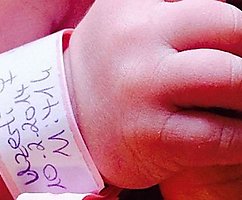Children who are shamed a lot, feel like failures
 Bashny.Net
Bashny.Net
Parents need constantly to adjust their standards and expectations to match the natural inclinations of the child. Abilities of the child change with age. Different children of different abilities.
If the child is weak in some area, it needs more assistance, to the extent that parents sometimes have to lead him by the hand. It is impossible to have the baby it felt like something was not right when he makes mistakes.
If you are too often shame the child, he had the impression that he bad, good-for-nothing or something wrong. He feels like a loser and lose their natural motivation to action and confidence.

Children under nine years of age I can not blame themselves when they are shamed. Any punishment, disapproval or dissatisfaction in response to the child's mistakes in the end cause the feeling of shame. If there is some problem and nobody else takes responsibility for it, the child accepts the blame.
Until nine years of age the child does not see the difference between "I did something bad" and "I'm bad". To nine years people still are not able to think logically. The baby responds to the situation in the following way: "If I've done something bad, so I bad or If I did something wrong, so I'm bad".
If the child has not yet developed a sense of self, makes a mistake, he has not yet rely on that. If he made a mistake, then he is a mistake. When a child assumes too much responsibility for something, the parents can rectify the situation by taking responsibility. If parents will take responsibility for something that happened to the child on himself, he will not feel guilt.
Many adults suffer from low self-esteem and feelings of worthlessness because they still haven't learned to see this difference. If it happens to make mistakes, these people come to the conclusion that they are not good enough.
These people have already developed the ability to think logically, but they are simply not taught to feel innocent to nine years of age. They can even understand the mind that is not bad, but deep down still feel bad or unworthy.
An adult with healthy self-esteem responsible for their own mistakes with acceptance and a desire to learn from those failures. Below I give some examples of how a healthy adult responds to his mistakes:
— If I've done something bad, that doesn't mean that I'm bad because I didn't know how to do better.
— If I've done something bad, that doesn't mean that I'm bad, because in addition to this I have made a lot of good.
— If I've done something bad, that doesn't mean that I'm bad, because now I can learn from your mistakes and continue to do better.
— If I've done something bad, that doesn't mean that I'm bad because I can repair the damage or repair done.
— If I've done something bad, that doesn't mean that I'm bad because I tried to do everything as best as possible. Others make mistakes, too, and they are not bad.
— If I've done something bad, that doesn't mean that I'm bad because I didn't want this to happen.
— If I've done something bad, that doesn't mean that I'm bad, because it was an accident.
— If I've done something well enough, I'm still good because you learn from your mistakes and soon I will make everything better.
— If I've done something well enough, I'm still good, because nobody expects me to perfection.
— If I've done something well enough, I'm still good, because today I just don't feel well or had a rough day.
— If I've done something well enough, I'm still good, because this task was too difficult for me.
— If I've done something well enough, I'm still good, because nobody is always on top.
— If I've done something well enough, I'm still good because I admit my mistake and can fix it in the future.
— If I've done something well enough, I'm still good, because other people might make the same mistake.
In each of these cases, people used logical thinking to distinguish between "I did something bad" and "I'm bad". Research on the development of children's consciousness clearly show that children up to nine years do not have the ability to think logically.
To teach a child to "fight back"
Mikhail Kazinik: to Take the children's childhood, to tell them a bunch of information — it is criminal
If you pay too much attention to mistakes of the child, he eventually begins to feel like he is bad or does not meet your requirements. Instead of paying too much attention to itself an error, positive education focuses on correcting errors, resolving the situation.
If the child knows he is good, he remains open to your guidance and cooperation; children, many of which are shamed, criticized, pulls, criticize just closed.published
From the book by John gray "Children are from heaven"
P. S. And remember, just changing your mind — together we change the world! ©
Source: vk.com/ekaterina_kes?w=wall-6084434_4152
If the child is weak in some area, it needs more assistance, to the extent that parents sometimes have to lead him by the hand. It is impossible to have the baby it felt like something was not right when he makes mistakes.
If you are too often shame the child, he had the impression that he bad, good-for-nothing or something wrong. He feels like a loser and lose their natural motivation to action and confidence.

Children under nine years of age I can not blame themselves when they are shamed. Any punishment, disapproval or dissatisfaction in response to the child's mistakes in the end cause the feeling of shame. If there is some problem and nobody else takes responsibility for it, the child accepts the blame.
Until nine years of age the child does not see the difference between "I did something bad" and "I'm bad". To nine years people still are not able to think logically. The baby responds to the situation in the following way: "If I've done something bad, so I bad or If I did something wrong, so I'm bad".
If the child has not yet developed a sense of self, makes a mistake, he has not yet rely on that. If he made a mistake, then he is a mistake. When a child assumes too much responsibility for something, the parents can rectify the situation by taking responsibility. If parents will take responsibility for something that happened to the child on himself, he will not feel guilt.
Many adults suffer from low self-esteem and feelings of worthlessness because they still haven't learned to see this difference. If it happens to make mistakes, these people come to the conclusion that they are not good enough.
These people have already developed the ability to think logically, but they are simply not taught to feel innocent to nine years of age. They can even understand the mind that is not bad, but deep down still feel bad or unworthy.
An adult with healthy self-esteem responsible for their own mistakes with acceptance and a desire to learn from those failures. Below I give some examples of how a healthy adult responds to his mistakes:
— If I've done something bad, that doesn't mean that I'm bad because I didn't know how to do better.
— If I've done something bad, that doesn't mean that I'm bad, because in addition to this I have made a lot of good.
— If I've done something bad, that doesn't mean that I'm bad, because now I can learn from your mistakes and continue to do better.
— If I've done something bad, that doesn't mean that I'm bad because I can repair the damage or repair done.
— If I've done something bad, that doesn't mean that I'm bad because I tried to do everything as best as possible. Others make mistakes, too, and they are not bad.
— If I've done something bad, that doesn't mean that I'm bad because I didn't want this to happen.
— If I've done something bad, that doesn't mean that I'm bad, because it was an accident.
— If I've done something well enough, I'm still good because you learn from your mistakes and soon I will make everything better.
— If I've done something well enough, I'm still good, because nobody expects me to perfection.
— If I've done something well enough, I'm still good, because today I just don't feel well or had a rough day.
— If I've done something well enough, I'm still good, because this task was too difficult for me.
— If I've done something well enough, I'm still good, because nobody is always on top.
— If I've done something well enough, I'm still good because I admit my mistake and can fix it in the future.
— If I've done something well enough, I'm still good, because other people might make the same mistake.
In each of these cases, people used logical thinking to distinguish between "I did something bad" and "I'm bad". Research on the development of children's consciousness clearly show that children up to nine years do not have the ability to think logically.
To teach a child to "fight back"
Mikhail Kazinik: to Take the children's childhood, to tell them a bunch of information — it is criminal
If you pay too much attention to mistakes of the child, he eventually begins to feel like he is bad or does not meet your requirements. Instead of paying too much attention to itself an error, positive education focuses on correcting errors, resolving the situation.
If the child knows he is good, he remains open to your guidance and cooperation; children, many of which are shamed, criticized, pulls, criticize just closed.published
From the book by John gray "Children are from heaven"
P. S. And remember, just changing your mind — together we change the world! ©
Source: vk.com/ekaterina_kes?w=wall-6084434_4152
Tags
See also
How to speak that children listened
Famous kids
A huge number of great people were desperate slowpoke
Alexander Loboc: If we listen attentively to the child, he will learn to listen to us
Scars education
After a failed suicide attempt Englishman Graham for many years feels dead
How to raise emotional intelligence in children: the 3 keys to success
What should be done up to 30 years to 50 feel great
















